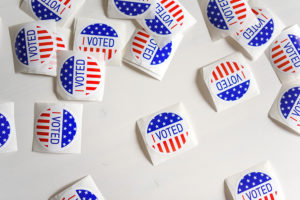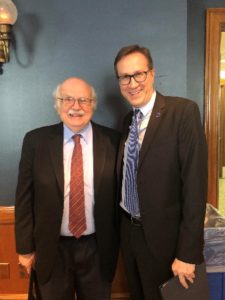Achieving Democracy
 Photo by Element5 Digital on Unsplash
Photo by Element5 Digital on Unsplash Americans today are thwarted on many fronts from achieving true democracy for all. Paramount are questions about the behavior of the commander in chief, whose actions threaten our very democracy and the very rule of law. Beyond President Trump, there are ongoing matters that must be addressed in order to achieve democracy.
Voting rights are challenged by biased laws and practices that seek to place barriers in the way of voters. Felony restrictions on voting disenfranchise many ex-offenders who’ve paid their societal dues. Gerrymandered political districts maintain those in power and prevent real representation. And voter systems are often manipulated to advantage some candidates over others, like districts in which voters were made to wait hours while numerous voting machines went unused in others.
Last week, I attended an event on Capitol Hill sponsored by Senator Tom Udall (D-NM) focused on “restoring the people’s covenant.” Even though I could quibble about whether or not they ever had such a covenant in the first place, I appreciated what Udall and the other speakers, including Representative John Sarbanes (D-MD) and former ambassador, Rabbi David Saperstein, had to say.
Senator Udall led his remarks pointing out how voting rights only exist when actualized, suggesting that not only must this basic right be accessible to all, but that it must be acted upon and made meaningful by its power to make a difference—not overshadowed by moneyed interests. “The American people are losing faith in democracy,” he said, and went on to explain the improper role of corporations and special interests in politics and how the required priority of fundraising prevents our representatives from doing their jobs.
Indeed, perhaps one of the most persistent problems in achieving democracy relates to campaign finance reform. Without it we find that those with the most dollars, even foreign actors, can elect their preferred politicians and ensure that our public leaders are beholden to them. And to make matters worse, as soon as progressive-minded activists gain any worthwhile changes in the system, it’s like an impossible game of whack-a-mole, as new loopholes are discovered and business as usual resumes.
When the Bipartisan Campaign Finance Reform Act of 2002 was enacted, it seemed there would be real limits on “soft money,” the money that goes to political parties instead of being directed to specific campaigns. The legislation appeared poised to prevent campaign expenditures beyond federal limits and end electioneering ads by nonprofits. However, the Supreme Court’s Citizens United ruling in 2010 stated that the government cannot prevent corporations from raising money for candidates, and it removed restrictions placed on political action committees to fundraise for candidates. This resulted in staggering increases in funds raised and spent. The 2008 presidential campaign, which topped $5.3 billion, was the most expensive on record, and as organizations continued to take advantage of the new rules it more than doubled in the 2016 campaign. A 2014 measure to overturn Citizens United was introduced in the Senate and approved by every Democrat, but Republican opposition prevented its passage. Republicans like US Senator Mitch McConnell argued that Democrats were trying to limit free speech, but the real result was that corporations could influence elections on a much larger scale than any single American could.

AHA Executive Director Roy Speckhardt (right) with Fred Wertheimer (left), former president of Common Cause.
While at this Capitol Hill event I re-acquainted myself with the elder statesperson in campaign finance reform, Fred Wertheimer. He was president of the watchdog group Common Cause back when I first joined the civil rights organization in high school. I find it daunting to see such little progress on campaign finance reform over the years, but I’m heartened to see Werthheimer and others continuing to fight the good fight, and I believe we can achieve results if we bring together a coalition of the willing. Strategies are in place to reverse Citizens United, new legislation is being developed, and with rampant corruption laid bare, motivation to make changes is gaining force. While we do all we can to seek progress, the area with the greatest potential to take us backward relates squarely to the separation of religion and government.
As if the existing campaign finance loopholes aren’t large enough, some religious conservatives are pushing to do away with the prohibition on churches getting involved in electoral politics, either by repealing the Johnson Amendment that prohibits such involvement, or by other direct means. If that happens, considering that funds donated to churches are anonymous, tax-deductible, and unlimited, churches would quickly become the funnel of choice for electioneering money. A likely side-effect of all this money flowing through churches would be significantly increased clout for the larger favored religions and, undoubtedly, a further dismantling of the wall of church-state separation.
So, in addition to our proactive campaign finance priorities, humanists and all defenders of democracy must remain vigilant about efforts like these to undermine the system. And integrated in our approach, we must remove barriers to voting and equalize access to this basic right. Through such a strategy, we might finally achieve true democracy.
